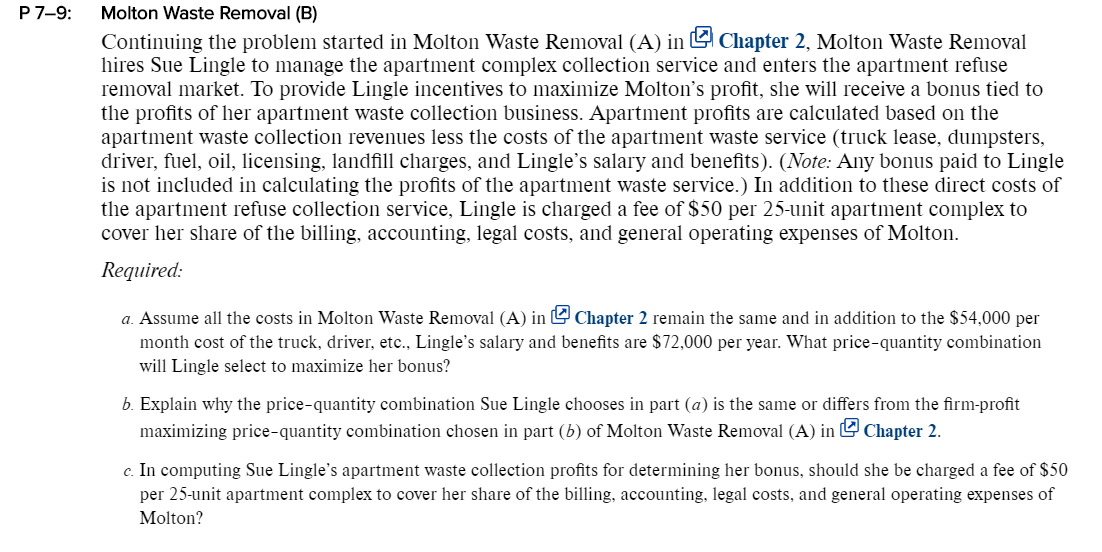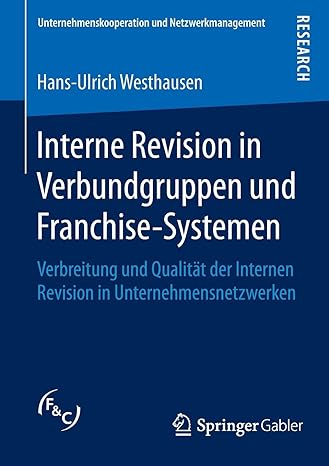
P 79: Molton Waste Removal (B) Continuing the problem started in Molton Waste Removal (A) in Chapter 2, Molton Waste Removal hires Sue Lingle to manage the apartment complex collection service and enters the apartment refuse removal market. To provide Lingle incentives to maximize Molton's profit, she will receive a bonus tied to the profits of her apartment waste collection business. Apartment profits are calculated based on the apartment waste collection revenues less the costs of the apartment waste service (truck lease, dumpsters, driver, fuel, oil, licensing, landfill charges, and Lingle's salary and benefits). (Note: Any bonus paid to Lingle is not included in calculating the profits of the apartment waste service.) In addition to these direct costs of the apartment refuse collection service, Lingle is charged a fee of $50 per 25-unit apartment complex to cover her share of the billing, accounting, legal costs, and general operating expenses of Molton. Required: a. Assume all the costs in Molton Waste Removal (A) in Chapter 2 remain the same and in addition to the $54,000 per month cost of the truck, driver, etc., Lingle's salary and benefits are $72,000 per year. What price-quantity combination will Lingle select to maximize her bonus? b. Explain why the price-quantity combination Sue Lingle chooses in part (a) is the same or differs from the firm-profit maximizing price-quantity combination chosen in part (b) of Molton Waste Removal (A) in Chapter 2. c. In computing Sue Lingle's apartment waste collection profits for determining her bonus, should she be charged a fee of $50 per 25-unit apartment complex to cover her share of the billing, accounting, legal costs, and general operating expenses of Molton? P 79: Molton Waste Removal (B) Continuing the problem started in Molton Waste Removal (A) in Chapter 2, Molton Waste Removal hires Sue Lingle to manage the apartment complex collection service and enters the apartment refuse removal market. To provide Lingle incentives to maximize Molton's profit, she will receive a bonus tied to the profits of her apartment waste collection business. Apartment profits are calculated based on the apartment waste collection revenues less the costs of the apartment waste service (truck lease, dumpsters, driver, fuel, oil, licensing, landfill charges, and Lingle's salary and benefits). (Note: Any bonus paid to Lingle is not included in calculating the profits of the apartment waste service.) In addition to these direct costs of the apartment refuse collection service, Lingle is charged a fee of $50 per 25-unit apartment complex to cover her share of the billing, accounting, legal costs, and general operating expenses of Molton. Required: a. Assume all the costs in Molton Waste Removal (A) in Chapter 2 remain the same and in addition to the $54,000 per month cost of the truck, driver, etc., Lingle's salary and benefits are $72,000 per year. What price-quantity combination will Lingle select to maximize her bonus? b. Explain why the price-quantity combination Sue Lingle chooses in part (a) is the same or differs from the firm-profit maximizing price-quantity combination chosen in part (b) of Molton Waste Removal (A) in Chapter 2. c. In computing Sue Lingle's apartment waste collection profits for determining her bonus, should she be charged a fee of $50 per 25-unit apartment complex to cover her share of the billing, accounting, legal costs, and general operating expenses of Molton







